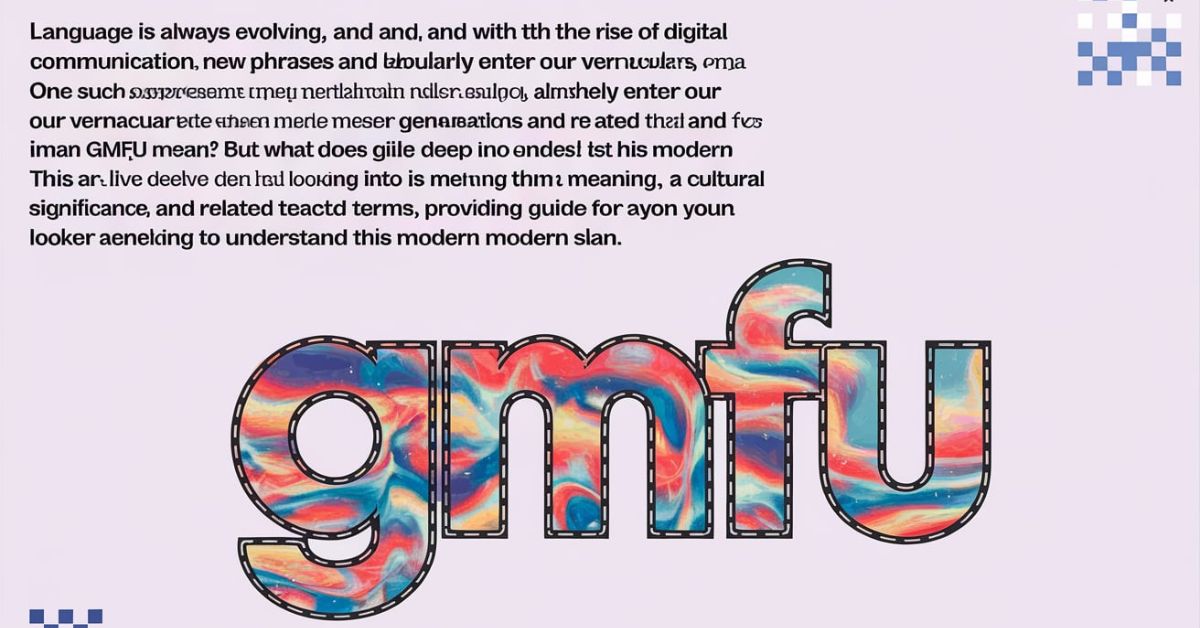What Does GMFU Mean: An In-Depth Exploration
Language is always evolving, and with the rise of digital communication, new phrases and abbreviations regularly enter our vernacular. One such expression that has gained traction, especially among younger generations and on social media platforms, is “GMFU.” But what does GMFU mean? This article will delve deep into its meaning, usage, cultural significance, and related terms, providing a comprehensive guide for anyone looking to understand this modern slang.
Understanding the Basics: What Does GMFU Mean?
GMFU stands for “got me f***ed up.” This phrase is typically used to express a state of confusion, frustration, or emotional disturbance. When someone says GMFU, they’re conveying that a situation has thrown them off balance, often in a humorous or exaggerated way. The term is colorful and expressive, making it popular in conversations, particularly among younger audiences who communicate primarily through text and social media.
The Emotion Behind GMFU
At its core, GMFU captures a strong emotional response. It can relate to various scenarios:
- Frustration: When a situation doesn’t go as planned or feels overwhelmingly complicated.
- Confusion: When something is difficult to understand or grasp, leaving someone feeling lost.
- Surprise: Sometimes, the phrase is used when someone is astonished by unexpected news or events.
This emotional versatility makes GMFU a valuable addition to modern slang, as it can fit into numerous contexts.
The Origins of GMFU
Like many slang terms, GMFU’s origins can be a bit murky. It’s believed to have emerged from internet culture, particularly among users of platforms like Twitter, TikTok, and Instagram. The abbreviation became popular in the early 2010s, coinciding with the rise of texting shorthand and memes that utilize abbreviated phrases to convey humor or exaggeration.
The Rise of Internet Slang
Internet slang has become a phenomenon over the last two decades. As communication has shifted online, especially among younger demographics, new words and phrases have quickly spread. GMFU is just one example of how language evolves through digital interaction, often driven by social media trends and cultural shifts.
How to Use GMFU in Conversations
Understanding the meaning of GMFU is just the first step; knowing how to use it in conversation is equally important. Here are some examples of how GMFU might fit into everyday dialogue:
- Reacting to Frustration:
- Situation: You just found out that an event you were looking forward to has been canceled.
- Response: “I can’t believe it! GMFU right now.”
- Expressing Confusion:
- Situation: You’re trying to understand a complicated assignment or project.
- Response: “After reading the instructions, I’m totally GMFU.”
- Surprise:
- Situation: A friend reveals unexpected news, like winning a contest.
- Response: “Wait, you did what? GMFU!”
In these examples, GMFU serves as a shorthand way to express complex feelings, allowing speakers to communicate emotions succinctly and effectively.
GMFU in Popular Culture
The phrase GMFU has also made its way into various aspects of popular culture, particularly in music, television, and social media. Here’s how it’s been represented across different mediums:
Music
Many contemporary artists have adopted modern slang in their lyrics, and GMFU is no exception. Its usage in songs can highlight themes of frustration, confusion, or unexpected life changes, resonating with listeners who relate to these sentiments.
Television and Film
While GMFU may not yet have found its way into mainstream television or film scripts, the sentiment it conveys is frequently represented. Characters often express similar feelings of being overwhelmed or confused, indicating that while the phrase itself may not be used, its meaning is relatable across various narratives.
Social Media
Platforms like Twitter and TikTok have played significant roles in popularizing GMFU. Users often employ the phrase in humorous memes or videos, amplifying its reach and embedding it deeper into the cultural lexicon. These platforms allow for quick dissemination of language trends, making GMFU a staple for expressing relatable emotions.
GMFU vs. Other Slang Terms
In understanding GMFU, it’s helpful to compare it with other slang phrases that convey similar sentiments. Here are some common alternatives:
- “WTF” (What the f*):** This is another expression of confusion or surprise but doesn’t carry the same emotional weight as GMFU.
- “FML” (F* my life):** Used to express despair or frustration, often in a self-deprecating manner.
- “SMDH” (Shaking my damn head): This is often used to convey disbelief or disappointment without necessarily expressing deep emotion.
While these phrases can express similar feelings, GMFU is distinct in its ability to articulate being “f***ed up” emotionally, encapsulating a broader range of experiences.
Analyzing the Impact of GMFU
The popularity of phrases like GMFU reflects broader societal trends in communication and emotional expression. Here are a few key points to consider regarding its impact:
Emotional Expression
Language is a powerful tool for expressing emotions. GMFU allows individuals to articulate complex feelings in a straightforward manner, making it easier to connect with others who might be feeling the same way. In a world where mental health awareness is growing, being able to express feelings of confusion or frustration openly can promote dialogue and understanding.
Cultural Trends
Slang terms often arise from cultural shifts and societal changes. GMFU may reflect the frustrations of modern life, especially as individuals navigate complex social dynamics, economic challenges, and personal issues. The rise of social media has also created a space for shared experiences, further solidifying the term’s relevance.
Connection Among Users
Using GMFU can foster a sense of belonging among those who share its meaning. Language is often a unifying force, and utilizing current slang can create connections between individuals who understand and relate to these expressions.
FAQs About GMFU
1. Is GMFU offensive?
GMFU contains a profanity that may be considered offensive in certain contexts. It’s essential to be mindful of your audience and the setting in which you use the term.
2. Can I use GMFU in professional settings?
Generally, GMFU is more appropriate for casual conversations among friends or peers. In professional environments, it’s best to use more formal language.
3. How can I express similar feelings without using GMFU?
You can express similar feelings by saying phrases like “I’m really frustrated,” “This has me confused,” or “I’m in disbelief.”
4. Are there variations of GMFU?
Yes, people may use variations like “got me messed up” to soften the language or make it more appropriate for different audiences.
5. Why do people use slang like GMFU?
Slang often evolves from a need for concise communication and emotional expression. Using terms like GMFU can convey complex feelings quickly and effectively, resonating with those familiar with the phrase.
Conclusion
In conclusion, GMFU, standing for “got me f***ed up,” is a colorful expression that captures a range of emotions, including confusion, frustration, and surprise. Its origins in internet culture highlight the evolving nature of language, especially in our digitally-driven world. As slang continues to evolve, understanding terms like GMFU will enhance our ability to communicate and connect with one another.
By embracing such expressions, we can better navigate the complexities of modern life and foster deeper conversations around our shared experiences. Whether you’re using GMFU among friends or simply trying to understand its cultural significance, it’s clear that this phrase represents more than just words—it encapsulates a feeling that many can relate to in today’s fast-paced world.






